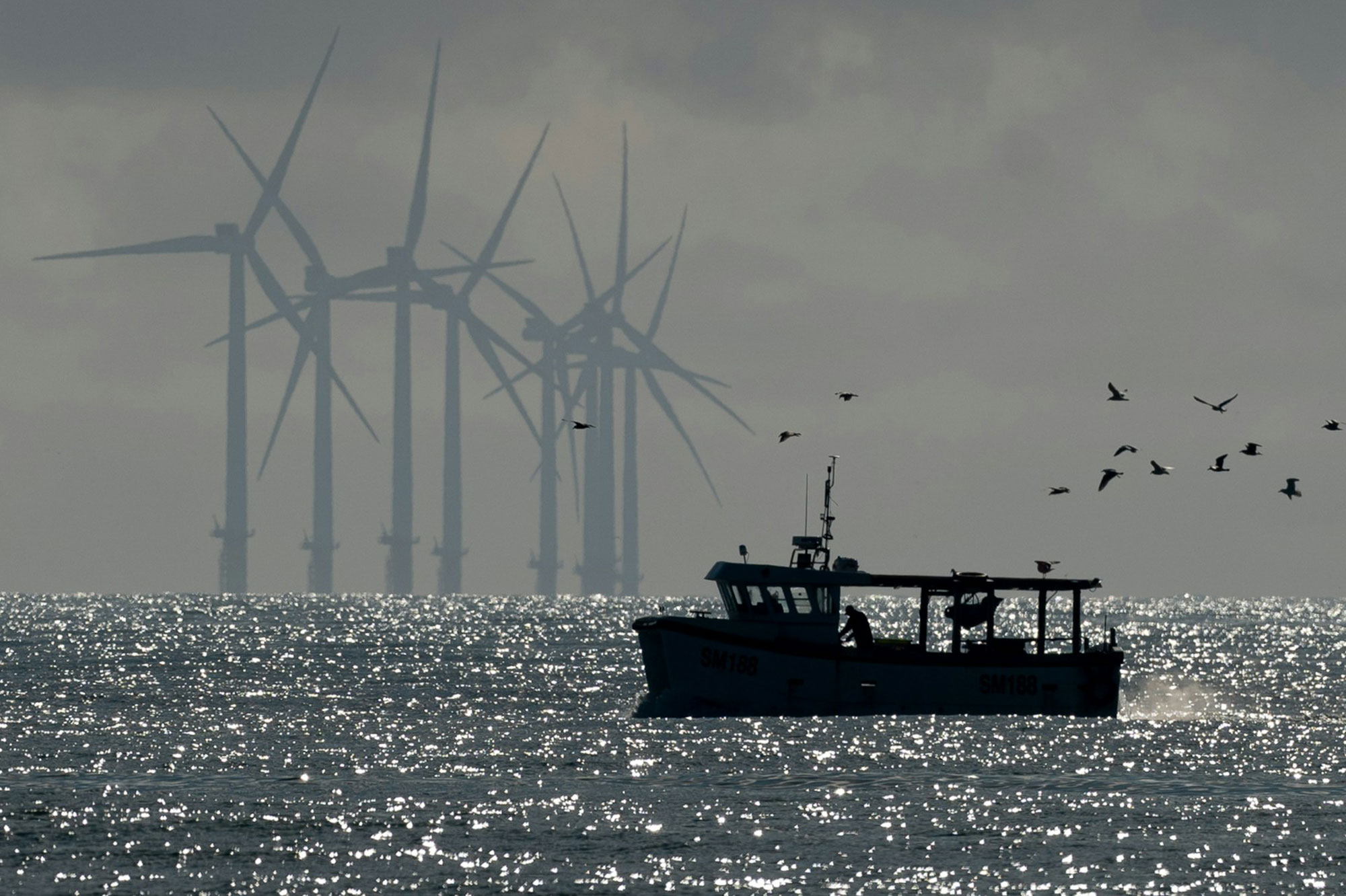Story
Can Offshore Wind Farms and the UK Fishing Industry co-exist effectively?
03 March 2025
PML-led research highlights urgent need for standardised compensation and improved collaboration between energy companies and fishermen

A new study, led by researchers at Plymouth Marine Laboratory (PML), alongside colleagues at the University of Aberdeen, has found that the majority of UK fishermen feel their livelihoods are being threatened by the rapid expansion of offshore wind farms (OWFs), with impacts felt across all vessel sizes and fleet sectors.
Led by PML’s Claire Szostek, the paper, “Spatial conflict in offshore wind farms: Challenges and solutions for the commercial fishing industry“, published in the journal Energy Policy, reveals that while the UK leads globally in offshore wind energy production – providing 45% of European capacity and 24% of global capacity – this growth is creating significant spatial conflicts with the commercial fishing industry as both sectors compete for limited marine space.
Key findings:
- Fishermen are being adversely impacted by displacement from offshore wind farms
- Mobile and static gears are affected with small (<15m) vessels less resilient to impacts
- There is a lack of standardisation in compensation payments made to fishermen
- Fishermen are concerned about ecological impacts on target species and habitats
- Best practice guidelines for industry need to be embedded in legal frameworks.
“Our survey revealed that fishermen across all fleet sectors are experiencing social, wellbeing, and economic impacts from offshore wind developments,” said Claire Szostek.
“While a small minority identified potential benefits, most fishermen feel their fishing grounds and livelihoods are under threat. What’s particularly concerning is the lack of standardization in compensation payments made to those affected.”
The first two offshore wind turbines in the UK were installed in the UK in the year 2000 and by 2022, there were 3197 turbines operating or under construction in UK waters.
The study highlights that despite UK law not explicitly excluding fishing from operational wind farms, practical co-existence remains disputed due to safety concerns over interactions between fishing vessels, gear, turbines, and subsea cables.
Furthermore, as Stephen Watson, co-author and researcher at PML, notes:
“The ecological impacts of offshore wind farms on commercial fish species and marine habitats are a significant concern for fishermen. While there are potential benefits like artificial reef effects, there are also risks from construction noise, electromagnetic fields, and changes to marine ecosystems that remain largely unquantified. These impacts add further strain to an already challenged fishing sector.”
Professor Nicky Beaumont, co-author of the study and Head of PML’s Sea and Society team, emphasises the need for policy changes:
“Our research makes it clear that best practice guidelines for industry need to be embedded in legal frameworks. With offshore wind installations increasing exponentially, there is a need to ensure a sustainable and fair energy transition, supported by increased collaboration and equity between commercial fishermen and energy companies.”
The research supports policy recommendations aimed at improving outcomes for the coexistence of offshore wind energy and commercial fishing, which could also serve as a model for other nations developing offshore wind energy.
The UK fishing industry, with 4,269 active vessels and employing over 6,800 fishermen in 2021, generated a turnover of £802 million with a profit of £222 million. Meanwhile, the UK offshore wind industry directly employed 17,000 people in 2023, with projections of over 88,500 jobs required by 2026. The study emphasizes that while offshore wind may exceed fisheries in monetary value, these figures do not account for the cultural heritage value of fisheries, which are vital to many coastal communities and important in fisheries policy development.
Main image credit: Photo by Bob Brewer on Unsplash
Related information
Read the paper:
C.L. Szostek, S.C.L. Watson, N. Trifonova, N.J. Beaumont, B.E. Scott, Spatial conflict in offshore wind farms: Challenges and solutions for the commercial fishing industry, Energy Policy, Volume 200, 2025, 114555, ISSN 0301-4215, https://doi.org/10.1016/j.enpol.2025.114555.